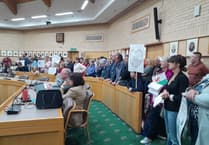On 3 September, Ceredigion’s Cabinet decided to consult on proposals to close four primary schools in Borth, Llanfihangel y Creuddyn, Llangwyryfon and Ponterwyd, with further schools nominated for potential closure in the future.
With pupil numbers in the twenties and gradual decline of birth rates and strained council finances, the schools are not deemed viable.
The next step in the process is consideration at the council’s learning communities scrutiny committee, followed by a period of consultation.
The Welsh Government’s School Organisation Code states that, before determining whether to proceed to consultation, the council must consider, amongst other things, all reasonable alternatives and the likely impact on the community.
The proposal papers did no such thing, and our communities feel a deep frustration with the dubious analysis, with many basic questions going unanswered, and lack of engagement with communities in the process.
For example, in Borth, a key driver for the loss of pupils is the loss of nurseries and childminders after the pandemic, which means that parents take their children to nurseries on the way to Aberystwyth and then end up placing their children in schools outside of Borth.
The answer is not to close our school but to work with the community to re-establish local early year childcare provision.
Schools play an immeasurable role in the viability and longevity of communities and are a critical component of the social and cultural fabric of rural areas.
Rural communities are dependent on social capital to generate economic sustainability and sustainable rural development.
Social capital consists of the mutual bonds that are generated by our school communities.
These links of reciprocity and trust generate the networks that support wider economic activity and are essential to the economic dynamism of the local community.
Closing schools destroys these bonds and also discourages working age families to move to rural villages, which are absolutely essential for their dynamism and sustainability.
None of this is considered, let alone costed, in the proposal papers.
They are also littered with dubious figures that make the schools look financially more stretched than they are.
Supposedly it costs £3,000 per year to clean gutters for one school.
There is no transparency and conflicting statements by the council around how additional school bus costs have been estimated.
The papers also ignore wellbeing impacts on pupils and the cost of vulnerable children’s inevitable need for additional support in larger schools.
Research shows that, unsurprisingly, neurodivergent pupils thrive more in smaller classes.
Borth was the first autism-friendly school in Ceredigion.
More than half of our pupils have additional learning needs, but we only rarely require extra staffing to address these needs. If these children are bussed to larger schools, they will need a great deal more support.
About 100 parents, teachers and children attended the Cabinet meeting.
It was a deeply frustrating affair demonstrating the worst of council politics. Half of the meeting seemed to be taken up by the almost verbatim reading out of the papers which everyone had already read, as if the meeting was being dragged out on purpose.
The remainder of the time was spent on repeatedly blaming others.
The Welsh Government was not providing enough money. Too many parents were not using their local school. The schools themselves had not presented detailed, credible alternatives (we were never asked to). Everyone was to blame except the Council and Plaid Cymru.
This is nonsense. School closures are a political choice, though it is hard to understand what is driving these proposals other than petty accounting.
Even if the projected savings would be realised, they would amount to a measly £50,000 per year for Borth with similarly low amounts for the other schools.
Losing a single council job could save a whole school.
The council has spent more subsidising the Ceredigion rally than it would save on closing the four schools.
Alternatives to closure have been dismissed out of hand and were not properly costed.
School communities have not been given the opportunity to develop and present their own business plans to show how they would address demographic and financial challenges.
Next week, the council’s learning communities scrutiny committee is meeting, where councillors will have a chance to interrogate the proposal papers.
They need to call them out for what they are: flimsy, back of the envelope calculations that have failed to properly consider the alternatives and impacts of closure.
There is no denying the challenges of financial austerity and an aging population, but closing schools worsens these problems by removing cornerstones of community dynamism, leaving long term damage to the social, economic and cultural fabric of our communities.
Instead, the Council needs to work together with communities to recognise and harness the unique characteristics of each school community develop plans for their long-term sustainability.



.png?width=209&height=140&crop=209:145,smart&quality=75)

Comments
This article has no comments yet. Be the first to leave a comment.